
A diplomatic mission or foreign mission is a group of people from a state or organization present in another state to represent the sending state or organization officially in the receiving or host state. In practice, the phrase usually denotes an embassy or high commission, which is the main office of a country's diplomatic representatives to another country; it is usually, but not necessarily, based in the receiving state's capital city. Consulates, on the other hand, are smaller diplomatic missions that are normally located in major cities of the receiving state. As well as being a diplomatic mission to the country in which it is situated, an embassy may also be a nonresident permanent mission to one or more other countries.
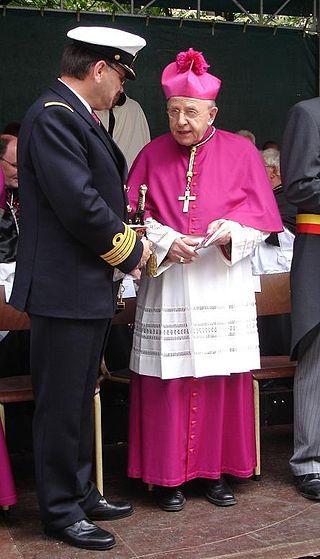
An apostolic nuncio is an ecclesiastical diplomat, serving as an envoy or a permanent diplomatic representative of the Holy See to a state or to an international organization. A nuncio is appointed by and represents the Holy See, and is the head of the diplomatic mission, called an apostolic nunciature, which is the equivalent of an embassy. The Holy See is legally distinct from the Vatican City or the Catholic Church. In modern times, a nuncio is usually an archbishop.
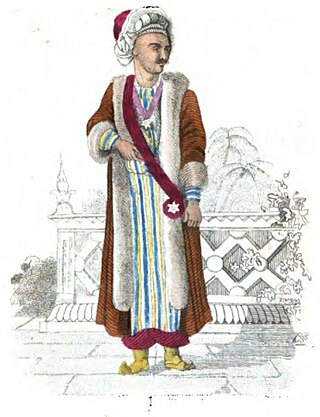
An ambassador is an official envoy, especially a high-ranking diplomat who represents a state and is usually accredited to another sovereign state or to an international organization as the resident representative of their own government or sovereign or appointed for a special and often temporary diplomatic assignment. The word is also used informally for people who are known, without national appointment, to represent certain professions, activities, and fields of endeavor, such as sales.

An apostolic nunciature is a top-level diplomatic mission of the Holy See that is equivalent to an embassy. However, it neither issues visas nor has consulates.
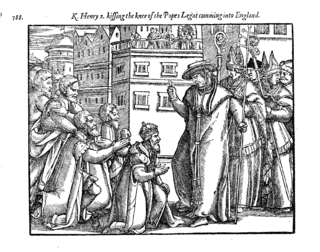
A papal legate or apostolic legate is a personal representative of the Pope to foreign nations, to some other part of the Catholic Church, or representatives of the state or monarchy. He is empowered on matters of Catholic faith and for the settlement of ecclesiastical matters.
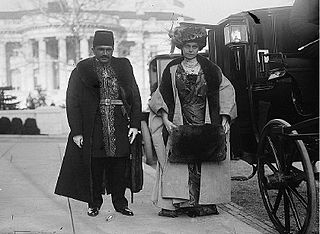
A chargé d'affaires, plural chargés d'affaires, often shortened to chargé (French) and sometimes in colloquial English to charge-D, is a diplomat who serves as an embassy's chief of mission in the absence of the ambassador. The term is French for "person charged with business", meaning they are responsible for the duties of an ambassador. Chargé is masculine in gender; the feminine form is chargée d'affaires.
Diplomatic rank is a system of professional and social rank used in the world of diplomacy and international relations. A diplomat's rank determines many ceremonial details, such as the order of precedence at official processions, table seatings at state dinners, the person to whom diplomatic credentials should be presented, and the title by which the diplomat should be addressed.
A permanent representative is a diplomat who is the head of a country's diplomatic mission to an international organisation.
In diplomatic usage, head of mission (HOM) or chief of mission (COM) from the French "chef de mission diplomatique" (CMD) is the head of a diplomatic representation, such as an ambassador, high commissioner, nuncio, chargé d'affaires, permanent representative, and sometimes to a consul-general. Depending on the context, it may also refer to the heads of certain international organizations' representative offices. Certain other titles or usages that would qualify as a head of mission or equivalent also exist. While they are primarily referred to by the other titles mentioned above, it is common for the diplomatic corps of a country to use deputy head of mission or deputy chief of mission (DCM) as the primary title for the second in command of a diplomatic mission.

A doyen or doyenne is the senior ambassador by length of service in a particular country.

The Apostolic Nunciature in the Philippines is a top-level diplomatic mission assigned by the Holy See to the Philippines, located at 2140 Taft Avenue, Malate, Manila.
The Holy See has long been recognised as a subject of international law and as an active participant in international relations. It is distinct from the city-state of the Vatican City, over which the Holy See has "full ownership, exclusive dominion, and sovereign authority and jurisdiction".

Holy See–Malaysia relations are foreign relations between the Holy See and Malaysia.

Carl-Ludwig Diego von Bergen was the ambassador to the Holy See from the Kingdom of Prussia (1915–1918), the Weimar Republic (1920–1933), and Nazi Germany (1933–1943), most notably during the negotiation of the Reichskonkordat and during the Second World War.

Foreign relations of Pope Pius XII extended to most of Europe and a few states outside Europe. Pius XII was pope from 1939 to 1958, during World War II and the beginning of the Cold War.
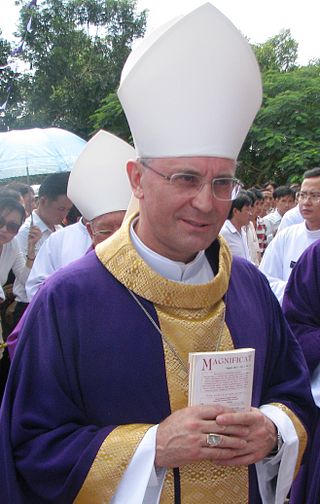
Leopoldo Girelli is an Italian prelate of the Catholic Church who serves as the apostolic nuncio to India and Nepal. He was nuncio to Israel and Cyprus as well as apostolic delegate to Jerusalem and Palestine from 2017 to 2021. He has worked in the diplomatic service of the Holy See since 1987 and previously served as nuncio to Indonesia, East Timor, and Singapore.

Augustine Kasujja is a Ugandan prelate of the Catholic Church who works in the diplomatic service of the Holy See. He was the Apostolic Nuncio to Belgium from 2016 to 2021.
The order of precedence among European monarchies was a much-contested theme of European history, until it lost its salience following the Congress of Vienna in 1815.













